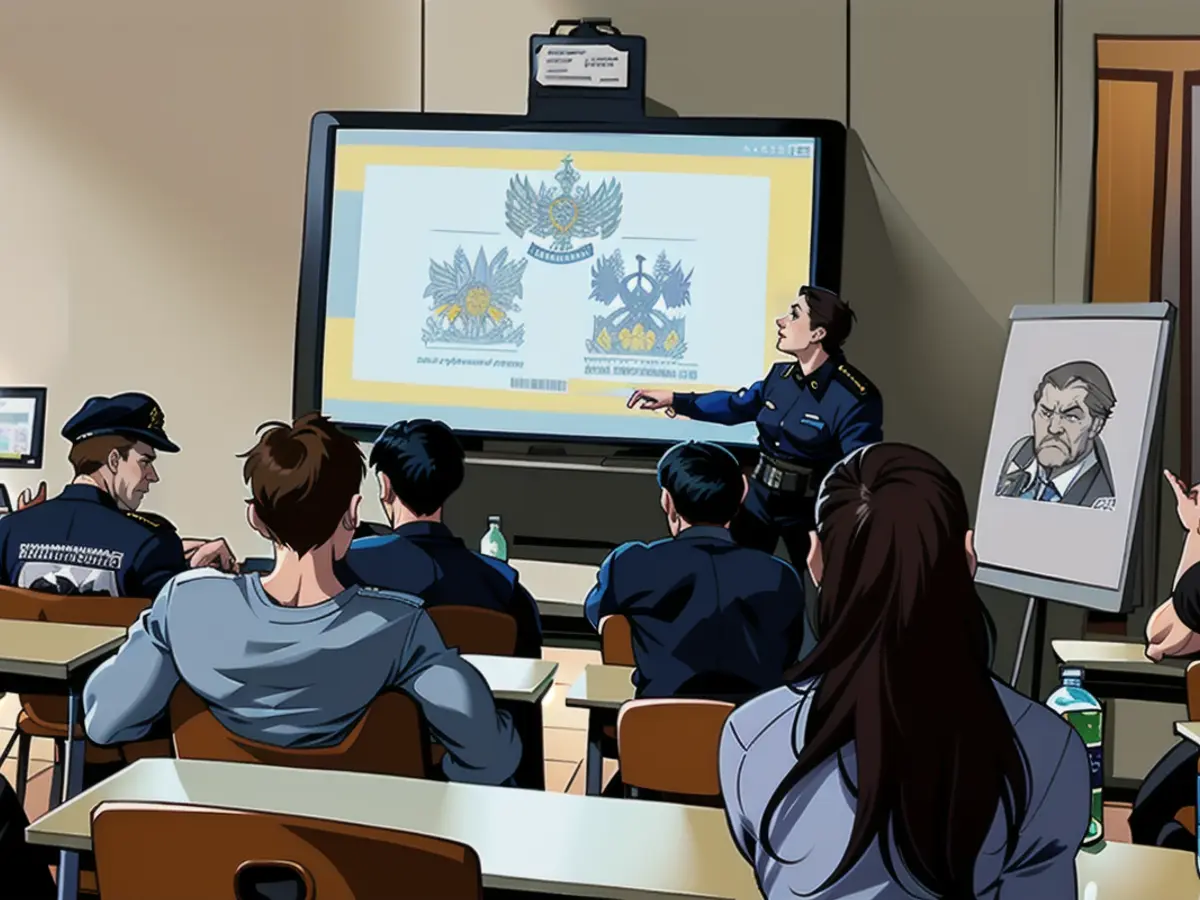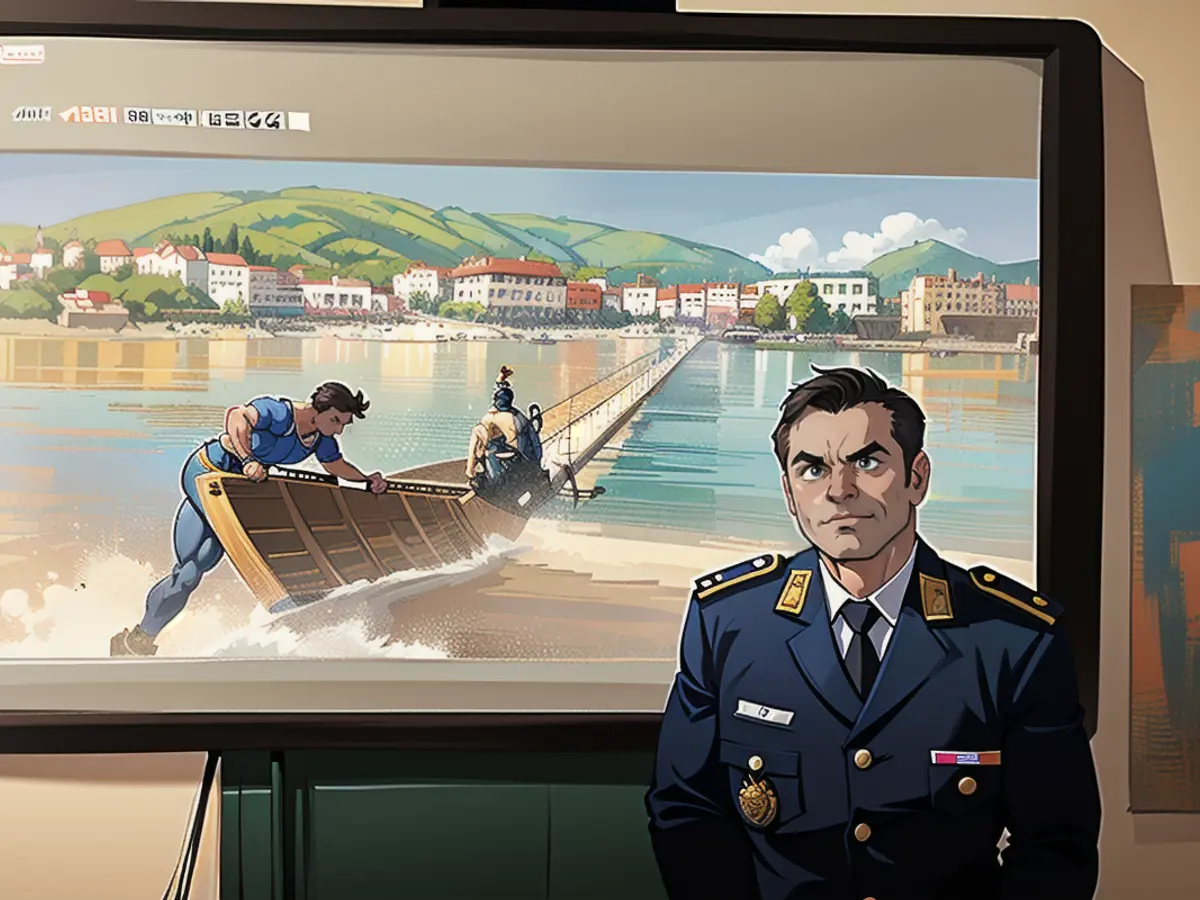When the German Armed Forces visit schools...
Military officers from the Bundeswehr are invited to speak at schools. While the ministry of education supports this initiative, trade unions are not on board. What exactly are students being taught? A closer look at a classroom.
There's unanimity in the room about whether the Bundeswehr should undertake operations abroad. Captain Jan Czarnitzki stands in a blue uniform in front of 20 ninth and tenth graders at the Nelson Mandela School in Berlin-Wilmersdorf. This youth officer is responsible for the seventh and eighth lessons. On the smartboard, it reads "Should Germany engage in the military?" The students move to different parts of the room based on their positions - pro, partially in favor, or against. Most of them are leaning towards a partial endorsement, with only two students firmly against it: "Germany should not support war," says one. After some contemplation, he acknowledges: "But if a country is in need, we should help."
"Can violence resolve conflicts?" poses Czarnitzki, and the students rapidly move about the room. "Try to resolve issues without violence first, but sometimes there's no other option," suggests one student. "If you're getting bullied in the schoolyard and you just say 'stop it', then the other person just keeps going," remarks another. The soldier highlights the complexities of conflicts: "There are never solely military solutions."
There are 94 youth officers in the Bundeswehr, specially trained soldiers who give presentations and seminars on security policy upon request. Czarnitzki has held this position for seven years. Their presentations are mainly given at schools, but a gardening association could technically make a request, he says in an interview with ntv.de. Last year, he and his colleagues in Berlin were on duty around 150 times. According to the Ministry of Defense, there were approximately 4,300 lectures nationwide in 2022, with the trend rising.
The Ministry of Education endorses these deployments. Minister Bettina Stark-Watzinger recently called on schools to establish a "relaxed relationship" with the Bundeswehr and explicitly included youth officers. "I believe it's significant for youth officers to come to schools and share what the Bundeswehr does for our security," she told Funke newspapers. She "cannot comprehend" the reservations expressed.
The teachers' union VBE disagrees, stating that it's the responsibility of educators, not soldiers, to educate children on "current social challenges." The German Education and Science Union (GEW), on the other hand, requests that the Bundeswehr's influence in schools be reduced. "The GEW denounces and condemns any attempts by the Bundeswehr to advertise in schools and other educational institutions," says their website. They argue that schools should not be used as recruitment hubs for professional soldiers.
"As youth officers, we can't and are not allowed to recruit. That would be a crime and would have legal consequences," explains Captain Czarnitzki. Instead of recruiting, the Bundeswehr is fulfilling its obligation to provide information. They follow the Beutelsbach Consensus of 1958, which outlines principles for political education work. It stipulates that no opinion should be forced on the students and that topics should be discussed so that each student can form their own viewpoint.
Bruno Osuch, a teacher of social studies and mathematics, invited the youth officer to the Nelson Mandela School. Some of his "pacifist" colleagues were reluctant to accept the invitation, Osuch admits with a laugh. "They thought they were being brainwashed."
The subject of today's double lesson: "The evolution of German security policy up until the turn of the millennium." This is only one of many lectures in the youth officers' selection; the war in Ukraine or the Middle East conflict could potentially be discussed as well. Yellow and blue stickers adorn physical maps of Germany and Europe pinned to the wall in the classroom: "Stop Putin Stop War," "#Stand with Ukraine." The students respond collectively with "Good morning," and one or two boys salute with a smirk.
The introductory group discussion is followed by a historical overview. Czarnitzki starts in 1955, when the young Federal Republic of Germany decided to rearm during the Cold War. "Defense," emphasizes Czarnitzki, referring to the relevant Article in the Basic Law. The next slide shows the Soviet Union, dissolved into several states. "Suddenly, we had a new world and the threat situation had vanished."
Czarnitzki asks about well-known "collective security systems" of which Germany is a member, like NATO, the UN, and the EU. Participation in these organizations is depicted on the smartboard through the burning towers of the World Trade Center. Czarnitzki outlines the series of events triggered by the terrorist attack: NATO alliance, Bundestag resolution, German involvement in the war in Afghanistan.
Despite some elements working smoothly, the Afghanistan mission ultimately resulted in a catastrophe, remarks the captain, referring to the Taliban's takeover in 2021 and the disorderly extraction of international soldiers. The pupils pay close attention, with a few of them occasionally checking their smartphones.
Czarnitzki was a soldier in Afghanistan ten years ago and spent three months there teaching air traffic controllers. For the 39-year-old, this was the most nerve-wracking yet remarkable period of his Bundeswehr tenure, which commenced straight after graduating from high school. His compulsory military service was followed by officer training, and in 2017, he eventually became a youth officer, "due to my interest in conveying security policy content in a comprehensible manner," as he mentions in the interview.
In the lecture, geopolitics is covered in the classroom, and the students are prompted to provide explanations for why global conflicts emerge. Czarnitzki shares the Stabile States Index, a tool that evaluates the stability of individual countries based on numerous factors. He also highlights where the Bundeswehr has provided official help: Coronavirus pandemic, Ahrtal flood, search for missing people. The defense of the Federal Republic of Germany appears to have been relegated to the backburner during decades of peace.
The captain proceeds to the turn of the century and addresses the topics that have dominated public discourse since the start of the Ukraine war. A chart displays which NATO member satisfies the two percent target and which doesn't. Visualizations depict the collective disarmament of NATO nations. Pupils learn that Germany and other allies have more than halved their troop numbers within 30 years.
"The state of the Bundeswehr is lacking"
A dearth in all areas of the Bundeswehr, explains Czarnitzki. The €100 billion special fund aids the rapid procurement of essential equipment, but this must first be generated. He cites Federal Commissioner for the Armed Forces Eva Högl, who states that €300 billion is more appropriate. "There are differing opinions on this given the lack of funds in numerous sectors." His stance: "The Bundeswehr serves as our insurance policy. When it comes down to it, it should somewhat function." One student inquires whether this might provoke other nations. "The world situation is perilous. We can't simply wait and see," asserts the soldier.
In the culmination, a pupil inquires what areas of study are available at the Bundeswehr University of Applied Sciences. Czarnitzki mentions that he's unable to disclose this information and directs them to the career guidance bureau. Would the youth officer suggest enlisting in the Bundeswehr? "I'd think twice about it. It's a matter of life and death when an emergency arises," responds the officer. Does he enjoy it? "I wouldn't be here if I didn't," he says.
After almost two and a half hours of presentations, the youth officer bids his students farewell, and teacher Osuch takes the class out for ice cream. He concludes, stating that the teachers' apprehensions were unfounded. "There was no indoctrination at all, it was highly objective." He believes a teacher wouldn't have been able to accomplish this in this fashion. "It's much different when there's a uniformed individual who comprehends the situation thoroughly."
Fifteen-year-old Laila declares the lecture fascinating yet the military is unrelated to her thoughts. "I could never carry a weapon," she says. Nineteen-year-old Thalia, who is also fifteen, states she acquired a wealth of new knowledge. "I used to think there was nothing else to do beyond war," she adds. Would she join the Bundeswehr someday? "The lecture made me consider it," she replies.

Read also:
- Floods: water levels remain critical in many places
- Snow chaos further restricts Bavaria
- Continuous operation in the flood areas
- Flood situation remains tense in many places
- Captain Czarnitzki, a German Armed Forces youth officer, often delivers presentations on security policy at schools, as part of the Bundeswehr's commitment to provide information and adhering to the Beutelsbach Consensus.
- The German education policy, expressed by Minister Bettina Stark-Watzinger, supports the participation of the Bundeswehr in schools, promoting a "relaxed relationship" between students and German Armed Forces representatives.
- International organizations like NATO play a significant role in German military involvement, as discussed in Bettina Stark-Watzinger's defense of the Bundeswehr's presence in schools and the education policy it follows.
Source: www.ntv.de






